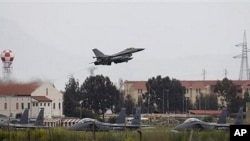The top U.S. military officer says a U.N.-authorized no-fly zone over Libya is "effectively" in place after the United States and its allies carried out a series of cruise missile attacks and airstrikes on Libyan military targets.
Admiral Mike Mullen told U.S. television networks Sunday that no Libyan government aircraft have flown over the country since the U.S.-led military operation began Saturday against Libyan air defenses and ground forces.
The no-fly zone is aimed at protecting Libyan civilians from attacks by forces loyal to Libyan leader Moammar Gadhafi, who is trying to crush a month-long uprising against his 42-year rule.
The U.S. military's Germany-based Africa Command says the United States used F-15 and F-16 warplanes and three B-2 stealth bombers in a series of airstrikes on pro-Gadhafi forces before dawn Sunday.
Mullen says the airstrikes targeted Libyan government troops near the eastern city of Benghazi, stopping them from marching on the opposition stronghold. Witnesses say the attacks destroyed dozens of military vehicles, leaving the bodies of pro-Gadhafi fighters strewn in the wreckage.
Western warplanes also dropped bombs on the outskirts of the Libyan capital, Tripoli, early Sunday, drawing anti-aircraft fire from government forces.
Gadhafi responded to the U.S.-led attacks by threatening to engage Western powers in a "long war."
In an audio address broadcast on state television early Sunday, Gadhafi labelled the United States and its allies as the "devil" and accused them of plotting to steal Libya's oil. He said his government has opened arms depots to Libyans to enable them to resist foreign forces.
Thousands of Gadhafi supporters have gathered at his highly-fortified Bab al-Azizia residence in Tripoli. Admiral Mullen accused the Libyan leader of using human shields to try to thwart coalition attacks.
Libyan state television says the airstrikes and missiles have killed at least 48 people, including children, and wounded about 150. Mullen says he has seen no evidence of civilian casualties from the operation.
The White House says President Barack Obama got an update on the military operation in a conference call with U.S. national security officials as he visited Brazil Sunday. It says he also discussed diplomatic consultations on the situation in Libya with the advisers, who included Secretary of State Hillary Clinton and Defense Secretary Robert Gates.
Earlier, Obama said the Libyan leader had given the West no choice but to take military action.
The operation began Saturday with French airstrikes and the firing of more than 100 cruise missiles by U.S. and British vessels in the Mediterranean. The U.S. Africa Command says the missile strikes destroyed 20 out 22 Libyan air defense facilities, while the status of the other two targets was being assessed.
Admiral Mullen said the United States expects to hand over leadership of the no-fly zone operation to its partners and play a supporting role in the coming days. He said the operation could achieve its goals even if Gadhafi holds onto power.
The U.N. Security Council passed a resolution Thursday authorizing the no-fly zone and the use of "all necessary measures" to protect civilians from attacks by pro-Gadhafi forces. Libyan government forces had been closing in on rebel-held towns.
The air and missile strikes represent the biggest international military operation in the Middle East since the 2003 U.S.-led led invasion of Iraq.
US: No-Fly Zone Over Libya Established; Gadhafi Threatens 'Long War'




